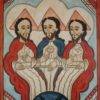Category: Evangelical Calvinist
Writings from the blog: Athanasian Reformed (aka The Evangelical Calvinist). Senior Reformed scholars present a coherent and impassioned articulation of Calvinism for today’s world.
Calvin in Barth’s Services on an ‘analogy of relation’ against Natural Theology and Her ‘Resourcers’ in scholasticism Reformed
Knowledge of God is the key, that is to the ‘secret of creation.’ If “Jesus Christ is indeed the real ground of creation,”[1] then in order to know what in fact creation is for, we must first know its Creator. But as Karl Barth underscores, in a rather Athanasian key, if Jesus is the ground of creation, and if Jesus is indeed the ‘Son of the Father,’ then to know the inner-ground, the secret of creation is first to know Jesus, to know the Son. As such, prior to knowing what and who creation is for, as the case may…
Doctoral Status Update
Update on my doctoral statuses. I have backed out of the PhD I was attempting to do with Concordia Academic Theology Consortium, Intl., and Martin Luther School of Bible and Theology. I have also “unaccepted” the honorary ThD presented to me by the same institution back in January of this year. After further research into the degrees offered, and some other circumstances, I have decided that this is the best alternative. That said, the church denomination associated with this educational institution, the General Lutheran Church, is legitimate. And its Dean has nothing but good and pure intentions. The gesture made…
God the Father
God is my Father.[1] Jesus said to Mary post-resurrection, “I ascend to My Father and your Father, and My God and your God.” God is our Father. Athanasius writes: “Therefore it is more pious and more accurate to signify God from the Son and call Him Father, than to name Him from His works only and call Him Unoriginate.”[2] This is the Christian way for knowing, for thinking God; this is the way those who have the Spirit can call Jesus, Lord; that is, as recognizing their Shepherd, knowing His voice as Son of the Father. As Athanasius rightly noted we…
Against ‘Penal Substitution’ and Transactional Models::For an Ontological Theory of Atonement
Matthias Grebe continues in his trek of offering a critique of Barth through Barth in regard to the loci of election and atonement. In his task he offers up a description, here in summary form, of various atonement theories propounded by the church fathers. He points out, rightly, that the fathers, in the main, (barring Augustine) would have rejected the penal substitutionary atonement (PSA) theory, and instead operated with a Christus Victor model, generally. He argues that the ’victim theory’ (his language for PSA) would not have been countenanced by them, and that instead something like Thomas F. Torrance’s theory…
Avoiding the Confessional/Conciliar Reduction: The Scripture Principle
Matthias Grebe offers a good word on the potential problem of being hyper-confessional/conciliar (my phraseology), to the point that said confessions and conciliar determinations come to reduce and coopt the possibility for thinking with greater depth and criticality in regard to the implications of Scripture’s attestation to its depth reality in Jesus Christ and the triune God. So Grebe: The varied understandings of key texts can obstruct consensus in theology. And yet, theology is best done in conversation. When this dialogue does not take place, the stronghold of various doctrines and opinions (often safeguarded by a small minority who thereby…
Kataphysics. TFT’s ‘stratified knowledge of God’ and the Christian Existence
Either something is, or it isn’t. Surely, there are nuances on a continuum, and we should all be aware of that as we approach any system or maybe better, organism of thought. Nonetheless, in the end, either a framework of thought is sound and corresponds to reality or it doesn’t. This seems like a good working definition of critical realism. If we apply this to a theological prolegomenon, what, in the end, will obtain, is that we will use various criteria to determine whether or not some belief structure, that we may or may not adhere to, is actually true…
What Does Barth’s Trinitarian Actualism Mean? Against the Monad
When in the realm of Barth studies, you will often hear of ‘Barth’s actualism.’ But what in fact is actualism in Barth’s theology? And might it, once understood, offer the way out of the classical modes of thought in regard to God’s relation to the world through the decretum absolutum (‘absolute decree’)? In other words, could Barth’s actualism allow us to understand God’s ways vis-à-vis the world in such a way that God is no longer understood to be a static monad, but instead, a relational and personalist God, who indeed is constituted by his perichoretic co-inhering relations as Father,…
What Happened to All of the Posts Critiquing classical Calvinism?
Calvinism continues to be of issue, particularly at the popular Church level. I haven’t posted as much on this issue over the last few years, it seems. It hasn’t been intentional. My blogging is typically shaped by my reading, and since much of my reading time has been consumed by Barth’s Church Dogmatics my blogging has reflected that (and of course the various other readings I am doing concurrent with that). It isn’t that I don’t find these matters of import, or interesting, it is just that in certain respects I have so exhausted myself on the various themes that…
A Response to Plato’s Impact on the Great Tradition of the Church
Earlier this morning I listened to Credo Magazine’s podcast in which Matthew Barrett interviews Louis Markos, the author of From Plato to Christ, among other books. You can listen to that podcast here. They were discussing, of course, the role and impact that Plato had, and continues to have on the development of Christian theology. Barrett often likes to refer to the Great Tradition of the Church, which of course is really more of a Latin way to think about things theological and ecclesial (the Greeks have the Consensus Patrum, ha!) I of course repudiate the general prolegomenon, or theological…
An Entrée to Karl Barth: A Suggested Reading List
A reader of the blog just contacted me via email to inquire about what I would recommend as introductory reading on and from Barth. The following is the list I put down off the top. 1) Michael Allen’s: Karl Barth’s Church Dogmatics: An Introduction and Reader 2) George Hunsinger: How to Read Karl Barth: The Shape of His Theology 3) The Cambridge Companion to Karl Barth 4) David Guretzki: An Explorer’s Guide to Karl Barth 5) Bruce McCormack: Orthodox and Modern: Studies in the Theology of Karl Barth 6) Christiane Tietz: Karl Barth: A Life of Conflict 7) Karl Barth, Dogmatics in Outline 8) Karl…







